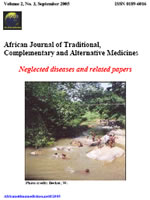
|
African Journal of Traditional, Complementary and Alternative Medicines
African Ethnomedicines Network
ISSN: 0189-6016
Vol. 13, No. 5, 2016, pp. 132-138
|
 Bioline Code: tc16124
Bioline Code: tc16124
Full paper language: English
Document type: Research Article
Document available free of charge
|
|
|
African Journal of Traditional, Complementary and Alternative Medicines, Vol. 13, No. 5, 2016, pp. 132-138
| en |
OXIDATIVE STRESS IN A RAT MODEL OF COTTON SMOKE INHALATION-INDUCED PULMONARY INJURY
Han, Zhi-Hai; Jiang, Yi; Duan, Yun-You; Wang, Xiao-Yang; Huang, Yan & Fang, Ting-Zheng
Abstract
Background: Smoke inhalation injury refers to airway and lung parenchyma injury and general chemical damage caused by
inhaling toxic gases and substances. The aim of this study was to explore the oxidative stress mechanism of cotton smoke
inhalation-induced pulmonary injury in a rat model.
Materials and Methods: Eighteen male Sprague-Dawley rats were randomly divided into control group, 6 h group, and 24 h group
(six rats in each group), which duplicated previous rat cotton smoke-inhalation injury models. Rats in 6 h and 24 h groups were
euthanised at 6 h and 24 h after smoke inhalation, respectively. ELISA method was used to detect indicators in the rats’ lung tissue.
Quantitative iNOS mRNA and γ-GCS mRNA measurements were performed using a fluorescence PCR method.
Results: The concentrations of MDA, NO, iNOS, γ-GCS, iNOS mRNA, and the relative expression of γ-GCS mRNA in the rats’
lung tissues in 6 h and 24 h groups were higher than control group (P < 0.05), and the concentration of NO and relative expressions
of iNOS mRNA and γ-GCS mRNA in 24 h group were significantly higher than 6 h group (P < 0.05). The concentrations of GSH in
24 h and 6 h groups were significantly lower than control group (P < 0.05), and that in 24 h group was even significantly lower than
6 h group (P < 0.05).
Conclusion: In rats with cotton smoke inhalation-induced pulmonary injury, the increased iNOS mRNA transcription can cause
increase of iNOS synthesis and promotion of NO synthesis. The increased γ-GCS mRNA transcription can cause increase of γ-GCS
synthesis and but decrease of GSH concentration. The activation of the antioxidant system is insufficient to combat oxidative stress
damage. So the oxidant/antioxidant system is imbalanced, leading to gradual aggravation of lung injury.
Keywords
Acute lung injury; Smoke inhalation injury; Oxidative stress
|
| |
© Copyright 2016 - African Journal of Traditional, Complementary and Alternative Medicines
Alternative site location: http://journals.sfu.ca/africanem/index.php/ajtcam
|
|
